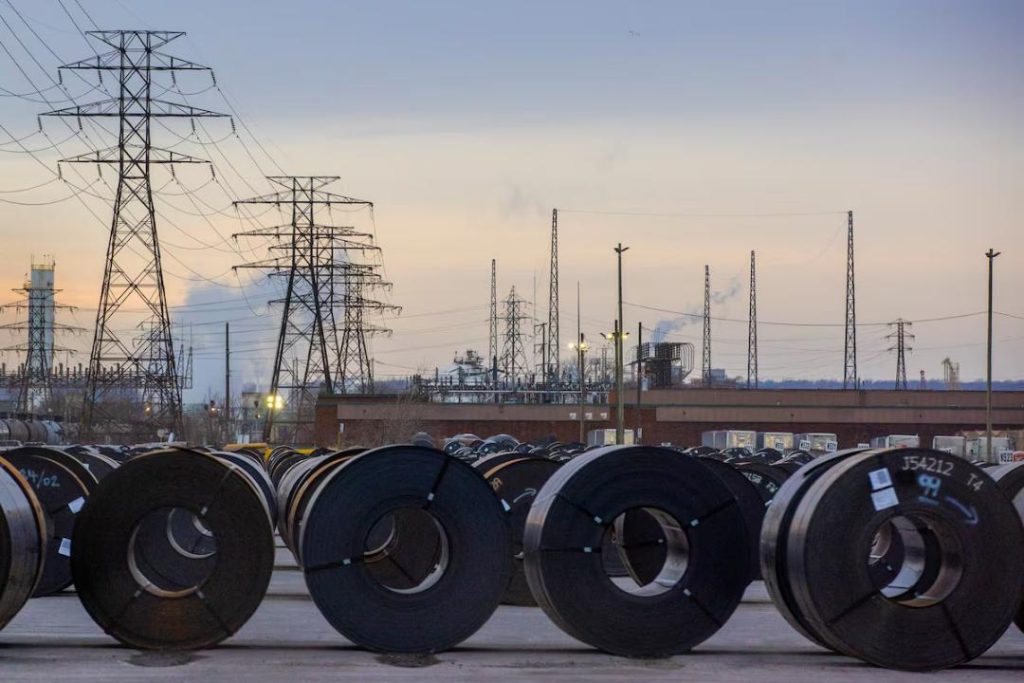
US Tariffs Hit Canada’s Steel & Aluminum Industry, Job Cuts Begin
The ongoing trade tensions between the United States and Canada have taken a devastating toll on Canada’s steel and aluminum industry. The imposition of US tariffs on these essential commodities has led to a wave of job cuts, with at least 200 workers already affected. The situation is expected to worsen with new tariffs set to take effect on April 2, prompting economists to warn of greater fallout ahead.
In a recent development, Canada Metal Processing Group has announced that it will be cutting 140 jobs due to the “threat of incoming tariffs.” This decision is a stark reminder of the far-reaching consequences of the US tariffs on the Canadian economy. The company, which employs over 1,000 people, has been a significant player in the steel and aluminum industry for decades. The news of job cuts has sent shockwaves through the industry, with many workers facing an uncertain future.
Marty Warren, National Director of the United Steelworkers, has expressed his concerns over the impact of the US tariffs on the Canadian steel and aluminum industry. According to Warren, the tariffs have led to a significant decline in demand for Canadian steel and aluminum products, resulting in job losses across the country. “The US tariffs have had a devastating impact on our industry, and it’s not just the jobs that are at stake,” Warren said. “The entire economy is being affected, and we’re seeing the consequences of the tariffs play out every day.”
The US tariffs on steel and aluminum were imposed in June 2018, with the aim of protecting American industries from what the Trump administration deemed to be unfair trade practices. However, the move has been widely criticized by Canada and other countries, which argue that the tariffs are an attempt to undermine their economies. The Canadian government has responded to the US tariffs by imposing retaliatory measures, including tariffs on American goods such as whiskey, peanut butter, and orange juice.
Despite the efforts of the Canadian government to mitigate the impact of the US tariffs, the steel and aluminum industry has been severely affected. The industry is a significant contributor to Canada’s economy, employing thousands of people and generating billions of dollars in revenue each year. However, the tariffs have led to a decline in demand for Canadian steel and aluminum products, resulting in a significant decline in production levels.
The job cuts announced by Canada Metal Processing Group are just the tip of the iceberg. Many other companies in the industry are also facing significant challenges, with some already announcing job cuts. The situation is expected to worsen with new tariffs set to take effect on April 2. These tariffs will apply to a range of additional Canadian steel and aluminum products, including pipe and tube, wire, and rebar.
Economists are warning of greater fallout ahead, with some predicting that the US tariffs could lead to a recession in Canada. The tariffs have already had a significant impact on the Canadian economy, with many industries facing challenges as a result of the decline in demand for their products. The construction industry, in particular, has been affected, with many builders and developers facing delays and cancellations due to the lack of availability of steel and aluminum products.
The situation is not without precedent. Canada has faced similar challenges in the past, including a steel crisis in the 1980s and a decline in the automotive industry in the 1990s. However, the current situation is unique in that it is a result of the US tariffs, which have been imposed without any apparent regard for the impact on the Canadian economy.
In conclusion, the US tariffs on steel and aluminum have had a devastating impact on Canada’s steel and aluminum industry, with job cuts already affecting hundreds of workers. The situation is expected to worsen with new tariffs set to take effect on April 2, prompting economists to warn of greater fallout ahead. The Canadian government must take immediate action to mitigate the impact of the US tariffs and protect the country’s industries from the devastating effects of this trade war.






